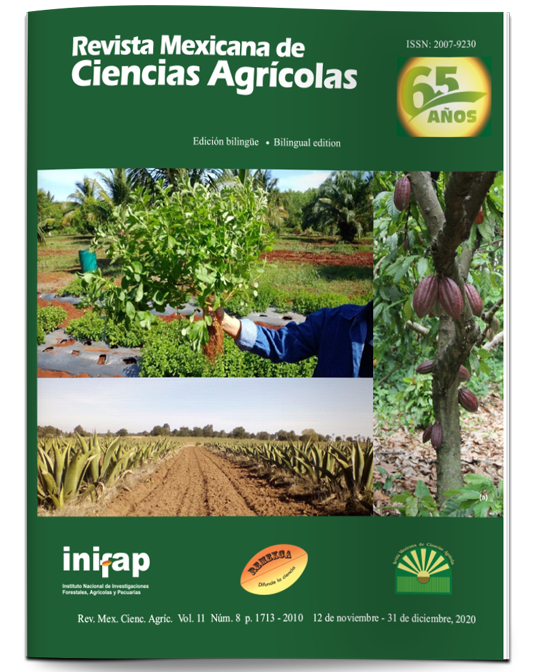Compost response on fertility, soil moisture, nutritional content in leaves and productivity in olive trees
DOI:
https://doi.org/10.29312/remexca.v11i8.2141Keywords:
Olea europaea L., organic matter, qualityAbstract
The use of organic residues represents a good alternative for the vegetable nutrition of the olive tree. The objective was to evaluate the effect of the compost application on the physical and chemical conditions of the soil, nutritional level in leaves, soil moisture and olive productivity in desert regions. The evaluation was carried out in an orchard located in the Caborca region, Sonora, Mexico during the years 2018 and 2019. The cultivar used was Manzanilla de Sevilla, with a spacing of 10 x 5 m (200 trees ha-1). The evaluated treatments were: 1) compost + wheat straw (C+P); and 2) absolute control (without compost or straw) (T). The parameters evaluated were: soil fertility, nutritional content in leaves, soil moisture, yield and fruit quality. The experimental design used was completely randomized with four replications. With the application of compost and wheat straw (C+P) the concentration of most of the edaphic nutrients, the content of organic matter, the cation exchange capacity and the salinity of the soil increased. In plant it increased the nutritional content in leaves. On the other hand, soil moisture, yield and quality of olives were not statistically affected with the incorporation into the soil of compost and wheat straw (C+P), in relation to the control (T). Despite an improvement in the soil, the application of compost in two years has not increased productivity in the olive tree.
Downloads
Published
How to Cite
Issue
Section
License
Copyright (c) 2020 Revista Mexicana de Ciencias Agrícolas

This work is licensed under a Creative Commons Attribution-NonCommercial 4.0 International License.
The authors who publish in Revista Mexicana de Ciencias Agrícolas accept the following conditions:
In accordance with copyright laws, Revista Mexicana de Ciencias Agrícolas recognizes and respects the authors’ moral right and ownership of property rights which will be transferred to the journal for dissemination in open access. Invariably, all the authors have to sign a letter of transfer of property rights and of originality of the article to Instituto Nacional de Investigaciones Forestales, Agrícolas y Pecuarias (INIFAP) [National Institute of Forestry, Agricultural and Livestock Research]. The author(s) must pay a fee for the reception of articles before proceeding to editorial review.
All the texts published by Revista Mexicana de Ciencias Agrícolas —with no exception— are distributed under a Creative Commons License Attribution-NonCommercial 4.0 International (CC BY-NC 4.0), which allows third parties to use the publication as long as the work’s authorship and its first publication in this journal are mentioned.
The author(s) can enter into independent and additional contractual agreements for the nonexclusive distribution of the version of the article published in Revista Mexicana de Ciencias Agrícolas (for example include it into an institutional repository or publish it in a book) as long as it is clearly and explicitly indicated that the work was published for the first time in Revista Mexicana de Ciencias Agrícolas.
For all the above, the authors shall send the Letter-transfer of Property Rights for the first publication duly filled in and signed by the author(s). This form must be sent as a PDF file to: revista_atm@yahoo.com.mx; cienciasagricola@inifap.gob.mx; remexca2017@gmail.
This work is licensed under a Creative Commons Attribution-Noncommercial 4.0 International license.



